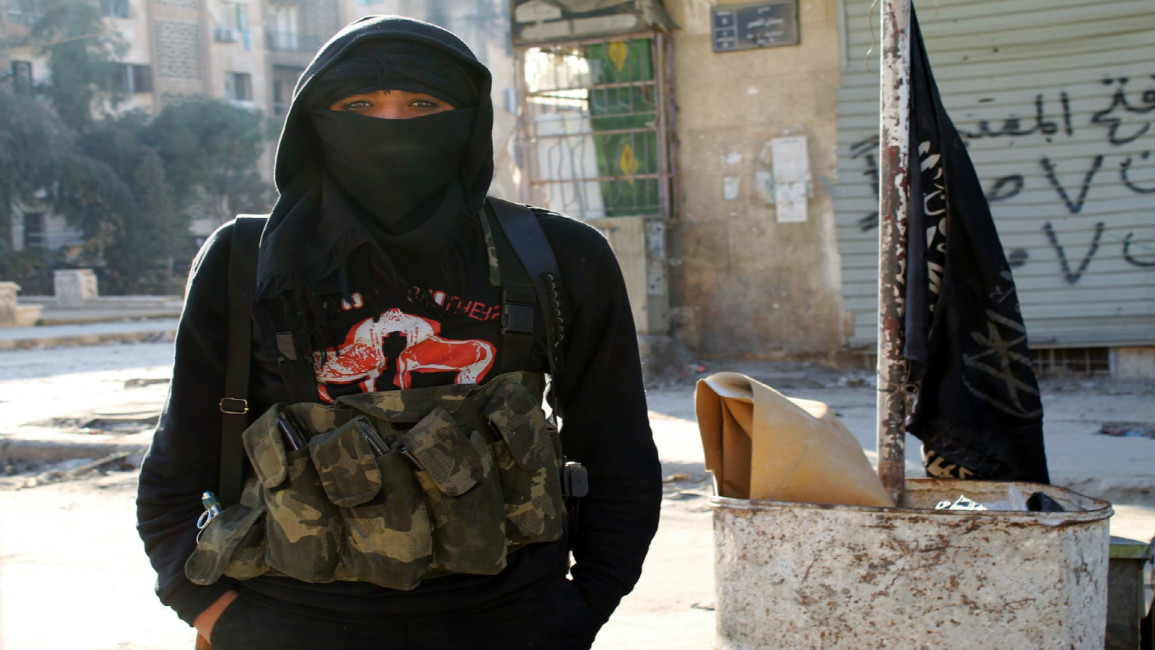
Nusra-vs-IS: Jolani reaps the fruits of Baghdadi's jihadist bandwagon
As coalition strikes continue to target the Islamic State, witnessing a slow but steady disintegration in its Syrian and Iraqi strongholds, Jabhat al-Nusra appears to be consolidating its presence in Syria where this week it severed ties with its mother organisation al-Qaeda. The move shows the organisation’s strong ability to adapt to the increasingly complex Syrian environment.
The Nusra Front has once again proven its deep understanding of local and external dynamics currently shaping the Syrian conflict.
On June 28, the organisation’s leader Abu Mohammed al-Jolani appeared on camera declaring “the complete cancellation of all operations under the name of Jabhat al-Nusra, and the formation of a new group operating under the name 'Jabhat Fath al-Sham', noting that this new organisation had no affiliation to any external entity.
Earlier, al-Qaeda second-in-command Ahmed Hassan Abu al-Khayr announced that Nusra’s leadership had been instructed to “go ahead with what protects the interests of Islam and Muslims and what protects jihad while al-Qaeda’s number one, Ayman al-Zawahiri added that “the brotherhood of Islam is stronger than any organisational links that change and go away”.
 |
By breaking ties to al-Qaeda, even if nominally, the Nusra Front showed a keen understanding of the dynamics of Syria's conflict |  |
Inheriting Islamic State
The Nusra Front move sheds new light on the organisation’s priorities in Syria: surviving in an increasingly hostile environment defined by external and internal challenges, consolidating its presence on the Syrian military theater and imposing itself as a major jihadist organisation in the backdrop of the Islamic State's (IS) military decline.
Organisational survival has translated into a pragmatic interpretation of external and internal pressures. In July, Russia and the US discussed the formation of a Joint Implementation Group (JIG) , envisioning intelligence sharing and possible direct operational cooperation against Jabhat al-Nusra, supposed to prevent Russia from targeting jointly designated (and presumably opposition-controlled) areas.
The new Russian-US partnership is one reason that may have accelerated Nusra’s decoupling from al-Qaeda as argued by Jolani who declared it had to “remove the pretext used by powers, including the US and Russia, to bomb Syrians.” Internal pressures may have as well influenced Nusra’s leadership decision.
In the last year, much discussion toward that goal took place within the group, with Abu Maria Qahtani arguing for the “Syrianisation” of the organisation, according to Syrian Islamic sources. “Syrian members of the Nusra front who represent the large majority were also in favor of severance of ties with al-Qaeda , “ said sheikh Hassan Dgheim, a Syrian cleric who studies Islamic organisations.
According to an article published in May, Qaeda had sent Rifai Taha, a co-founder of the Egyptian militant group al-Gamaa al-Islamiyya, to Syria to stop infighting that had erupted between Nusra and Ahrar al-Sham and convince them to forgo of their global jihad and cooperate with other factions.
 |
The Nusra Front's separation from al-Qaeda central responds to the organisation’s second priority: consolidate its presence on Syrian soil by facilitating alliances with other rebel groups |  |
Working with other rebels
The Nusra Front's separation from al-Qaeda central responds to the organisation’s second priority: consolidate its presence on Syrian soil by facilitating alliances with other rebel groups, previously hesitant to join forces with them due to the al-Qaeda affiliation.
“This will certainly have repercussions on Islamic factions,” says Aleppo journalist Ahmad Abi Zeid.
The move garnered as well the approval of respected jihadist ideologues such as Jordanian cleric Abou Mohammad Maqdessi as well as Saudi preacher Sheikh Abdallah Muheisini, the cleric of the Fateh army.
Powerful Syrian rebel factions such as Ahrar sham also applauded the Nusra front decision while others such Abu Hamza Hamawi, the head of the salafi Ajnad Sham faction said it could facilitate military unity.
 |
Nusra’s “ divorce” from Qaeda could also translate into increasing financial revenues as it would encourage countries such as Turkey, Qatar as well as private donors from Arab countries to funnel money to organiation |  |
A divorce of convenience
Nusra’s “ divorce” from Qaeda could also translate into increasing financial revenues as it would encourage countries such as Turkey, Qatar as well as private donors from Arab countries to funnel money to organisation.
However, severance of ties with global jihadism may also place the organisation at a disadvantage. Sheikh Dgheim underlines that in the last three months, several members of the group defected to the Islamic State.
This phenomena may be indicative of a wider disaffection of the Nusra Front hardliners, specifically its mouhajereen (foreign fighters) who may decide to join other extremist organisations such as Jund al-Aqsa, IS or form their own battalions due to ideological differences with the latter organisation.
Jabhat Fateh al-Sham is now vying to become the strongest salafist jihadist organization in Syria, against the backdrop of the decline of its competing sister organisation the Islamic State.
Nusra’s break with Qaeda carries many implications on the longer term: while the group may preserve its radical ideology, it rebranding will certainly force it over time to develop more localised creed and goals, resulting eventually in a new Jihadist hybrid, distinct from its former Nusra self, Qaeda and IS.
Mona Alami a non-resident fellow with the Atlantic council covering Middle East politics with a special interest in radical organizations. Follow her on Twitter: @monaalami
Opinions expressed in this article remain those of the author and do not necessarily represent those of The New Arab, its editorial board or staff.




